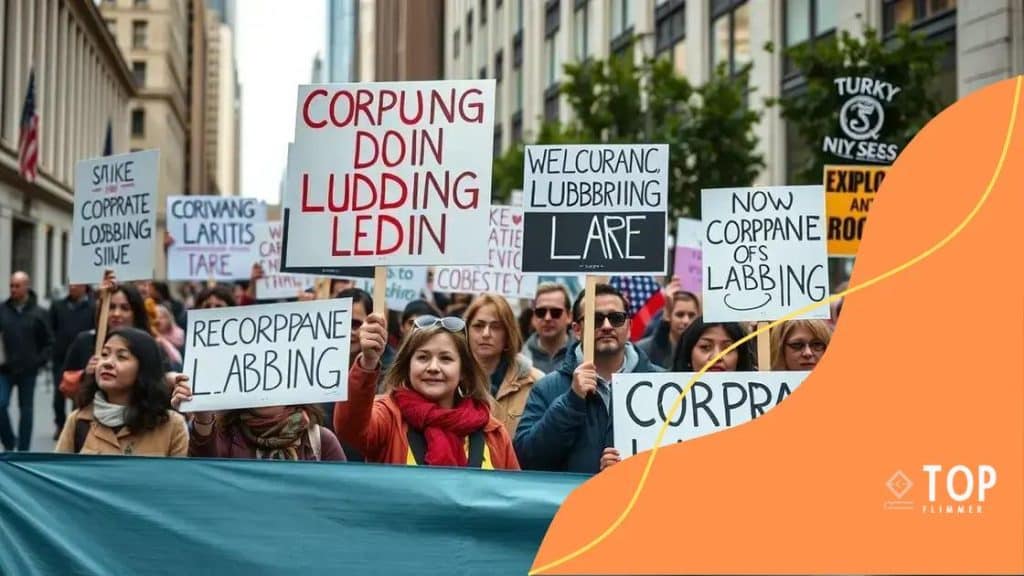Anti-corporate lobbying protests 2025: what’s at stake?

Anti-corporate lobbying protests aim to challenge corporate influence in politics, advocating for reforms that ensure transparency and prioritize the public interest over corporate profits.
Anti-corporate lobbying protests 2025 are gearing up to make waves. As public awareness grows, you might be wondering how these protests will reshape the landscape of corporate influence. Let’s delve into the reasons and movements driving this change.
Understanding anti-corporate lobbying
Understanding anti-corporate lobbying is essential in grasping the dynamics of modern activism. These movements arise from public frustration with perceived corporate overreach and its influence over politics.
The Core of Anti-Corporate Lobbying
At its heart, anti-corporate lobbying protests seek to challenge the power that large corporations wield in shaping policies. Activists argue that excessive corporate influence leads to laws that benefit a few at the expense of the many.
Key Motivations Behind Protests
Several factors motivate these protests:
- The demand for greater transparency in government dealings with corporations.
- A call for policies that prioritize the public good over corporate profits.
- Concerns about environmental impacts and worker rights being sidelined.
Many people feel disenfranchised when they see decisions being made that favor corporate interests, highlighting a growing divide between the average citizen and powerful lobbyists.
The Role of Grassroots Movements
Grassroots movements play a pivotal role in organizing anti-corporate lobbying protest efforts. They often employ social media to mobilize supporters quickly and keep them informed. As protests gain momentum, they can significantly influence public opinion and policy discussions.
These movements raise essential questions about democracy and representation, leading many to reconsider who truly holds power in our society. The intersection of community activism and political change illustrates how citizens can stand up against corporate dominance.
Key protests to watch in 2025
Key protests to watch in 2025 are shaping the landscape of activism around the globe. As citizens become more aware of corporate influence, several movements are emerging as vital touchpoints.
Global Movements on the Rise
In 2025, major protests are expected to focus on environmental issues and social justice. Activists are linking corporate lobbying to harmful practices, making their voices heard in significant ways.
Top Protests to Follow
Here are some protests to keep an eye on:
- The Climate Action March, advocating for sustainable policies that counter corporate pollution.
- The Fair Wages Rally, calling for legislative changes that address income inequality.
- The Corporate Accountability Demonstration, aiming to reduce corporate influence in politics.
Each of these protests represents a collective response to public demands for fairness and accountability. Participants are diverse, showcasing the wide range of individuals affected by corporate practices.
The Impact of Social Media
Social media plays a crucial role in organizing these protests. Platforms allow activists to share real-time updates, coordinate logistics, and attract attention to their causes. Visibility is key in ensuring that these protests resonate on a larger scale.
Moreover, the ability to connect with others globally helps amplify the message. People are not just protesting locally; they are joining a worldwide conversation about corporate power and the need for reform.
The role of social media in activism

The role of social media in activism has never been more significant than today. With the rise of digital platforms, activists can reach wider audiences and mobilize support quickly.
Instant Communication and Organization
Social media allows for instant communication, making it easier to organize events and share information. Activists use platforms like Twitter, Facebook, and Instagram to engage supporters and spread awareness about their causes.
Key Functions of Social Media in Activism
Some important functions include:
- Real-time updates on protests and events.
- Creating online communities that discuss and promote activism.
- Amplifying marginalized voices that might not be heard in mainstream media.
This ability to connect is crucial for building momentum. Many movements have gained traction through viral posts and hashtags that rally people around specific issues.
The Impact on Public Awareness
Social media also plays a vital role in raising public awareness. By sharing stories and information about corporate lobbying and its effects, activists can educate individuals who may be unaware of these issues.
As more people become informed, the pressure on corporations and governments to change increases. The collective online presence can show that there is a united demand for reform, making it harder to ignore.
Impacts of corporate lobbying on society
Impacts of corporate lobbying on society are profound and multifaceted. As corporations exert increasing influence over political systems, many aspects of society are affected.
Changes in Legislation
One significant impact is the alteration of laws to favor corporate interests. This often leads to regulations that prioritize profit over public well-being. For instance, laws related to environmental protection or healthcare can be weakened when corporations lobby against them.
Key Effects on Society
Here are some effects that highlight the impact of corporate lobbying:
- Increased economic inequality, as laws often favor the wealthy.
- Reduced access to essential services for everyday citizens.
- Suppression of innovations aimed at improving public health and safety.
These changes can result in a public that feels disenfranchised, leading to protests and movements calling for reform. When ordinary citizens perceive that their needs are neglected, social unrest often follows.
Public Trust and Disillusionment
As corporate lobbying distorts the political landscape, public trust in institutions can erode. People may begin to believe that their voices are ignored, resulting in lower civic engagement. When the government appears to cater to corporate interests, many feel their votes and opinions do not matter.
Ultimately, the long-term consequences include growing disillusionment with political processes. This can lead to decreased voter turnout and a lack of participation in democratic practices, as citizens feel powerless to instigate change.
Future implications for lobbying reform
Future implications for lobbying reform are crucial to understanding how democracy may evolve. As awareness about the negative impacts of corporate lobbying rises, calls for reform are gaining momentum.
Potential Legislative Changes
One key area of focus for reform is the introduction of stricter regulations on lobbying activities. Proposed changes could include:
- Enhanced transparency requirements for lobbying groups.
- Stricter limits on campaign contributions from corporate entities.
- Establishing a public registry of lobbyists to improve accountability.
These changes aim to ensure that the political environment is fairer and less influenced by corporate interests, paving the way for more equitable governance.
Shift in Public Awareness
The increase in public interest around lobbying reform signifies a shift in societal attitudes. As people become more informed about how lobbying affects their lives, they demand change more vigorously. This awareness can lead to greater participation in political processes.
Grassroots movements and online activism are likely to continue playing a significant role in pushing for reforms. Social media campaigns can bring together like-minded individuals and amplify their voices, making it more challenging for lawmakers to ignore these demands.
International Perspectives on Lobbying Reform
Looking globally, several countries are already implementing lobbying reforms. Observing these international efforts can provide valuable insights for future reforms in the U.S. and elsewhere. Successful examples might inspire similar movements domestically.
As reform discussions progress, it’s essential to explore and adapt these international strategies to fit the specific political climate of different nations.
FAQ – Frequently Asked Questions about Anti-Corporate Lobbying Protests
What are anti-corporate lobbying protests?
Anti-corporate lobbying protests are movements aimed at challenging the influence of corporations on politics and advocating for reforms that prioritize public interest over corporate profits.
Why is social media important for activism?
Social media is crucial for activism as it allows for quick communication, broad outreach, and helps to organize protests, keeping supporters informed and engaged.
What are the potential reforms for lobbying?
Potential reforms may include stricter regulations on campaign contributions, enhanced transparency for lobbyists, and requirements for accountability in lobbying activities.
How can citizens get involved in lobbying reform?
Citizens can get involved by participating in protests, engaging in discussions on social media, supporting grassroots movements, and advocating for legislative changes.






